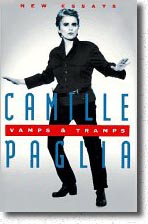 |
By: HART
WILLIAMS Contributing Reviewer
|
||
In the talk show forums, Paglia often comes across as needing center stage, demanding that other participants listen to what she thinks, but refusing the converse.
|
Vamps & Tramps Camille Paglia is a charming, mercurial, observant and cheerfully Rabelaisian troublemaker. Vamps & Tramps is a collection of multimedia moments from her most recent hectorings. There are essays, talk show transcripts, television documentary transcripts (BBC) and, displaying perhaps an obsession with celebrity, magazine and newspaper accounts of Camille Paglia, cartoons featuring Camille Paglia (or mentioning Camille Paglia), and so forth. There are reviews, essays and criticism written by Camille Paglia: from Madonna through Lewis Carroll, D.H. Lawrence and Susan Sontag. But, throughout this eclectic explosion of interpretation, two constants emerge: First, Camille Paglia feels (it might be paraphrased) that current feminism has gone "Barbie doll. " Secondly, Camille Paglia, media celebrity, says so. The former is troublemaking; the latter a bit troubling. Her arguments are mortar rounds lobbed at mainstream "feminist inquisitors," whom Paglia identifies as "white, middle-class women. " Paglia writes: "I think that feminism has gotten very shrewish. " And modern feminism is, to a degree, a college phenomenon. "White middle-class girls at elite colleges and universities seem to want the world handed to them on a platter. They have been sheltered, coddled and flattered. " Paglia attacks these feminists gleefully, lampooning the use of buzz words like, "patriarchy," or "date rape," and tearing into the politically correct interpretations of the tale of the Bobbits, and the Amy Fisher Joey Buttafuoco case. Her prose is dancing, her methods protean, and her glee is uncontained. This is an intellectual performance in the sense of a theatrical performance. What is astonishing is that Paglia's observations and thesis remain consistent throughout. Paglia the critic is often at odds with Paglia the performer. She constantly refers to "my book" - Sexual Personae . In the talk show forums, Paglia often comes across as needing center stage, demanding that other participants listen to what she thinks, but refusing the converse. Some of the best venom in the book is used to attack the "vinyl carpetbaggers" of the universities: "ambitious, apolitical literature teachers discovered that easily learned leftist posturing brought professional prestige and advancement. " Part of her concern over the state of public discourse stems from Paglia's conviction that we have lost our classical heritage in "new" education. And, the reader is left to conclude, these professors from the '60s are responsible, in large part, for midwifing the new "Barbie" feminism. Paglia is passionate, her observations are acute, her conclusions logical. If nothing else, the reader will find a unique view of the social order, an entirely different perspective. But there is a disquieting element that suggests: If the author is this desperate for our attention, is she holding her opinions because she believes in them? Or, is she saying what she feels readers will react to? Either way, Camille Paglia is an exhilarating writer, and well worth reading. Would that more books and authors were this interesting.
Hart Williams is a free-lance writer who lives in Eugene, Ore. © 1994 Hart Williams
|
 Collection captures the caustic Paglia `Vamps & Tramps' conveys Paglia's view
of today's social order.
Collection captures the caustic Paglia `Vamps & Tramps' conveys Paglia's view
of today's social order. 
